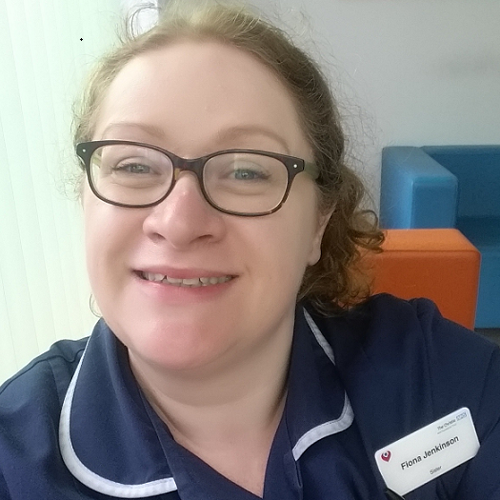Fiona Jenkinson works at The Christie as a nurse, but she also spends some of her time working in the spiritual care service as a chaplain. Here, Fiona talks about how she supports people with their spiritual needs and how her work as a nurse informs her chaplaincy.

When I tell people that I’m both a nurse and a practising priest, they find it very hard to believe. But it’s true. I work at The Christie NHS Foundation Trust, a specialist cancer centre in Manchester, as both a blood cancer nurse and a member of the chaplaincy team – a group of 7 people from a range of different faiths who support staff and people with cancer at The Christie. We’re there to be a listening ear to people of all faiths, and none.
So, how did I get here? I always wanted to be a nurse specialising in cancer. I even chose my university for that reason. I’ve been working as a blood cancer nurse here at The Christie for nearly 24 years now, and I can’t imagine doing anything else.
My relationship with the chaplaincy team started in about 2011 when I started volunteering, doing things like referring people for support. Volunteers are really important to what we do. Each volunteer is assigned a ward and they check in on people to see who could benefit from our support. Their work generates between 30 and 50% of the referrals to our service. We couldn’t do what we do without them.
I was ordained in 2016 and became a member of the team in 2019. I spend 30 hours a week as a nurse and 7.5 in the chaplaincy. In terms of the core team, there are 2 Church of England ministers – Andrew Bradley and I – and Lisa Barrett who is a rabbi. We also have 4 honorary chaplains from the Roman Catholic, Muslim, and Orthodox Jewish faiths.
I’d say that I probably work with people differently than someone with no medical experience. When I visit people as a chaplain, I can’t switch off from being a nurse. It helps me understand more about the person as a whole so that I can support them in the best way possible. We all bring something different to the table. My colleague Lisa is trained in meditation and mindfulness, for example.
The person, not religion is at the heart of everything we do
You might be surprised to know that a third of all the people we support do not prescribe to any particular religion. That’s because we are primarily there to support the person, and not just the faith. We’re there to be a listening ear and to provide support in any way we can. Some people will have support from more than one member of the team, for example.
I’m proud that we are an inclusive team that values the diversity of the people we work with, both staff and patients. Past team members have been a part of the lesbian, gay, bisexual and transgender (LGBT+) community, and we recognise that most people have more than one identity, and that’s something that should be celebrated.
